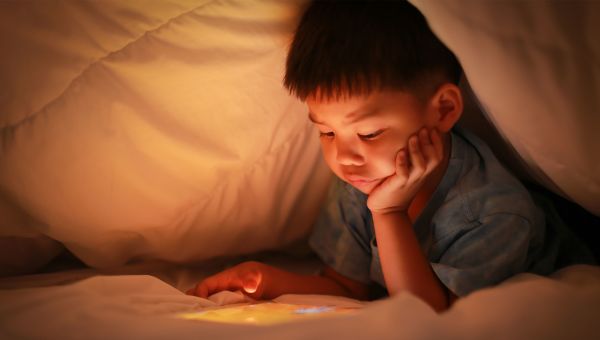Is Poor Sleep Making Kids Obese?

Childhood obesity is an American epidemic, affecting almost 1 in 5 children and adolescents. And while it’s well understood that unhealthy diets and a lack of physical activity contribute greatly to the problem, more research suggests that poor sleep influences obesity in kids, as well.
“There are lots of studies showing that kids who are not getting enough sleep tend to have more problems with being overweight,” says Heather Schramm, MD, PhD, a pediatrician at Oak Hill Hospital in Brooksville, Florida. And generally, the less dozing children and adolescents do, the higher their chances of developing obesity.
That’s an issue, Dr. Schramm says, because, “as a whole, Americans are not doing a good job of getting kids enough sleep.” The problem begins when children are young and grows worse as they age. A 2015 report from the Centers for Disease Control and Prevention (CDC), for instance, estimated that about 6 of 10 middle schoolers and 7 of 10 high schoolers didn’t sleep sufficiently on school nights.
So, how are sleep and weight linked, exactly? What’s keeping kids from getting adequate ZZZs? And what can we do to improve their chances of a good night’s rest?
How poor sleep affects weight
First, it’s important to understand how obesity affects kids’ health. Among other problems, it’s linked to high blood pressure, type 2 diabetes, difficulty breathing, digestive conditions, and musculoskeletal issues. Mental health disorders like anxiety and depression are more likely in obese kids, as are low self-esteem and social struggles. Obese children are also likelier to become obese adults, with a potential for serious health conditions, like heart disease and cancer.
Though the exact ways sleep affects weight aren’t known, there are a number of theories. Metabolically speaking, some research in adults suggests a lack of sleep is linked to lower levels of leptin—a hormone that curbs your appetite—and higher levels of ghrelin, a hormone that fires up your appetite.
Bad sleep habits may affect children’s dietary behaviors, too. First, kids who stay up late simply have more time to chow down. Then, those lost hours of sleep can affect what they eat the next day. “Kids who are tired tend to eat more and tend to have poor food choices,” says Schramm. She adds that sleepy children may be moody, making them prone to emotional eating, as well.
And just as regular exercise can help you sleep, a lack of sleep can also influence physical activity. The American Academy of Pediatrics (AAP) recommends kids get at least 60 minutes of exercise each day. But, says Schramm, “If kids are tired and fatigued, they’re not out being active and exercising, so they’re not burning off what they’re eating.”
Why kids aren’t sleeping
For optimum health, kids should get generally more sleep than adults, and the younger they are, the more they need. The American Academy of Sleep Medicine and AAP recommend the following amount every 24 hours per age group:
- 1 to 2 years: 11 to 14 hours, including naptime
- 3 to 5 years: 10 to 13 hours, including naptime
- 6 to 12 years: 9 to 12 hours
- 13 to 18 years: 8 to 10 hours
“Unfortunately, kids, even from a young age, are not getting the recommended amount of sleep,” says Schramm. A 2018 meta-analysis in the journal Sleep found that, on average, kids across all age groups were getting less sleep than even the recommended lowest levels.
The reasons for lost sleep depend partly on age. For younger children, some of it is related to poor sleep training and resistance to bedtime. “Sometimes that gets reinforced by them being allowed to sleep with the parents,” notes Schramm. “We end up in these cycles of bedtime taking two hours.”
For older children and teenagers, lifestyle factors in. Caffeine in soda and coffee contributes to poor sleep, as do increasingly hectic schedules. “They tend to have more homework and more extracurricular activities,” says Schramm. This may cause adolescents to sleep in on weekends to make up for lost time, further disrupting their sleep schedules, she adds, “and it’s just a never-ending cycle.”
And a big-time, common sleep issue for all kids: screen time. Whether it’s watching TV in their bedroom or texting friends late into the evening, nighttime use of electronics is strongly correlated to problems dozing. “Even in the younger children, media is a huge problem,” says Schramm. The devices worsen sleep by interrupting kids’ internal clock and stifling the production of melatonin, a hormone that helps us nod off.
How to help kids sleep
While poor sleep habits are connected to increased odds of obesity, the drawbacks don’t stop there. They’re also associated with a higher risk of injuries and hypertension, along with poorer attention, memory, behavior, and mood—all of which affect school performance, as well as quality of life. So, what can you do to help make sure kids get a good night’s sleep?
- Remove electronics from the bedroom, especially at night. Ideally, children shouldn’t have a TV, smartphone, computer, or video game system in their room at all. Turn off all devices at least one hour before bedtime.
- Keep regular sleep schedules. To address inconsistencies and help kids fall asleep faster, prioritize standard bedtimes and wake-up times. Schramm says a routine can help settle kids down and signal it’s time to hit the sack: “I take my shower, I read a book, I say good night, and I go to bed.”
- Practice what you preach. “Kids are going to do what they see you do,” says Schramm. So, if you stay up late watching TV or zoning out on social media, don’t be surprised if they mimic your behavior. Modeling good sleep habits sets a standard your children can follow for life.
- Get them outside and moving. It’s true, lots of exercise and fresh air helps kids get their ZZZs. It doesn’t have to be organized sports or a complicated, planned event, either. Just riding bikes and playing with friends around the neighborhood will do the trick.
Schools can help, too, by instituting start times later on in the morning for middle and high school students, whose sleep cycles shift after puberty. Organizations like the AAP and the American Medical Association recommend that districts kick classes back to 8:30 a.m. or later. This way, they mesh better with adolescents’ natural biological wake-up times and help them avoid sleep deprivation.
Ultimately, teaching kids healthy behaviors while they’re young provides a strong foundation for good health later on. And it can all start with a good night’s sleep.
Sourcing: CDC, Harvard Medical School, Nemours, National Sleep Foundation, American Academy of Pediatrics, National Institutes of Health


